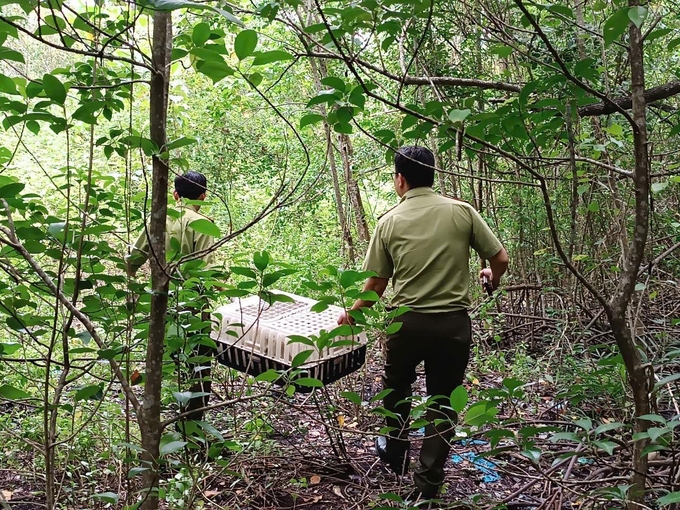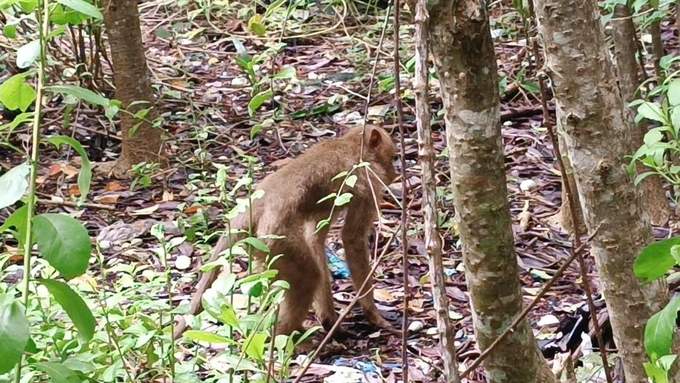May 20, 2025 | 21:49 GMT +7
May 20, 2025 | 21:49 GMT +7
Hotline: 0913.378.918
May 20, 2025 | 21:49 GMT +7
Hotline: 0913.378.918
On September 26, the Ho Chi Minh City Wildlife Rescue Station, in collaboration with the Can Gio Protective Forest Management Board and the Can Gio Forest Protection Unit, organized the release of five long-tailed macaques (Macaca fascicularis) into their natural environment at the Can Gio protective forest (Can Gio district).
A representative from the Ho Chi Minh City Forest Protection Sub-Department stated that these macaques were seized as administrative violations in the Can Gio district in 2023. The Forest Protection Sub-Department received them for rescue, care, and rehabilitation, ensuring they were healthy and ready to be returned to their natural habitat.

Five long-tailed macaques were cared for and rehabilitated before being released into their natural habitat. Photo: NT.
According to Decree No. 06/2019/ND-CP, long-tailed macaques belong to the class of mammals and are listed as a species of endangered, precious, and rare animals (Group IIB, less endangered). They live in troops ranging from 10 to 100 individuals, with the dominant male usually marking territory less than other monkey species. They are social animals, and the young have the ability to become independent early.
Long-tailed macaques have a gestation period of 160 to 170 days, reach maturity at 50 to 51 months, and have a lifespan of 37 to 38 years. They are omnivorous, primarily feeding on fruits, seeds, tree shoots, leaves, insects, frogs, and toads, and they are also excellent swimmers.

Long-tailed macaques are listed as endangered, precious, and rare species that need conservation. Photo: Provided by the Can Gio Protective Forest Management Board.
Mr. Huynh Duc Hoan, Head of the Can Gio Protective Forest Management Board, stated that since the beginning of the year, the unit has received various animals, including otters and macaques, and will continue to manage and protect these individuals.
"The release of rare and endangered wildlife into their natural habitat contributes to efforts to preserve biodiversity in forest areas. Additionally, we will engage in more awareness campaigns and fight against poaching and illegal wildlife trade in the future," said a representative of the Can Gio Protective Forest Management Board.
The Can Gio Protective Forest is home to a diverse and rich ecosystem, with 318 species of higher plants, 89 species of insects, 282 species of fish, 36 species of amphibians, 36 species of reptiles, 164 species of birds, 35 species of mammals, 66 species of floating animals, and 66 species of floating plants...
Translated by Hoang Duy

(VAN) In 2024, over 295 million people across 53 countries and territories faced acute hunger—an increase of almost 14 million people compared to 2023, while the number of people facing catastrophic levels of hunger reached a record high.

(VAN) World Environment Day 2025 (June 5) carries the theme 'Beat Plastic Pollution' continuing to emphasize the global urgency of addressing the plastic waste crisis.

(VAN) This was the assessment shared by experts at the workshop titled 'Assessing the Role and Potential of Low-Emission Rice Production Systems in Vietnam,' held on the morning of May 19.

(VAN) Cai Rong Port is the fisheries control center of Quang Ninh, helping to monitor fishing vessels, combat IUU fishing, and remove the EC's 'yellow card'.

(VAN) The German Agricultural Society (DLG) explores the possibility of establishing a mechanization service center in Vietnam’s Mekong Delta to support farmers in accessing and utilizing advanced machinery.

(VAN) On May 16, the Department of Water Resources Management, in collaboration with the Food and Agriculture Organization of the United Nations (FAO), held a signing ceremony for the GEF-8 project document.

(VAN) Food safety, mechanization, vocational training, and market opening are key areas of cooperation expected between the Vietnamese Government and the Federal Republic of Germany.